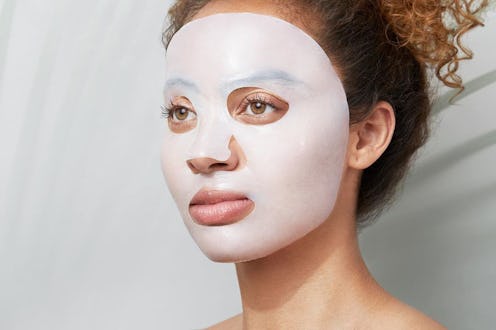There are few things that make me feel more helpless than my cystic acne. Unlike pimples or blackheads, extractions won't work on them (unless I want to ruin my skin), as the build-up is beneath the skin rather than above. I just have to power through it, applying topicals and hoping it goes away after a week. However, those pesky bumps often take their time, staying glued to my face for up to a week. And while I've come across some great spot treatments for when they're already on the surface, I hadn't really found anything that outright prevented the appearance. That is until I gave into the CBD for acne trend.
I was admittedly a bit pessimistic about the trendy ingredient. Not because I don't believe in the benefits of CBD, but because it's showing up in basically every aspect of beauty, without much science to back it up. However, when I came across a chic sheet mask from MASK promising to sooth acne-prone skin, I decided to give it a try. Knowing that my monthly cycle was near, I applied it one night before bed, and saved the excess serum of CBD, hyaluronic acid, aloe vera, and manuka honey extract in the fridge. But I knew that a one-time try wouldn't be enough. So for two months, I'd use the excess serum on my chin and jawline area right before my period began (and before the cystic bumps sprouted up). Like magic, the bumps didn't appear at all, giving me one less thing to be emotional about.
"Treating both inflammation and oil production, CBD targets the two biggest culprits in cases of active acne," Dr. Deanne Mraz Robinson, MD of Modern Dermatology in Connecticut says. "Additionally, CBD packs vitamins A, D, and E, and essential fatty acids, which all promote healthy skin. Acne is an inflammatory skin condition, so soothing products that lower inflammation will improve outbreaks." The ingredient also assists in regulating skin hydration and oil production on the sebaceous glans. "By reducing inflammation, it may allow sebum produced to travel to the surface without becoming clogged and trapped below the skin's surface," Robinson says.
However, there's still research to be done on the buzzy ingredient. "CBD does have anti-inflammatory properties so for that reason it may have some benefit, but clinical studies on a final formulation is always necessary to determine if a specific product is actually beneficial in the skin," Dr. Carl Thornfeldt, MD, Idaho-based clinical dermatologist says.
To reap the greatest benefits of CBD, Dr. Robinson suggests applying your CBD skincare first, preferably at night. "I would suggest you think of CBD as a vitamin or supplement - a concentrated ingredient that will be most effective when it is applied to clean skin," Dr. Robinson says insisting that the active ingredient can be used with other ingredients that follow. "Also CBD and hemp are not the same thing, so don't expect the same results!"
Experts:
Dr. Deanne Mraz Robinson, MD of Modern Dermatology in Connecticut.
Dr. Carl Thornfeldt, MD, Dermatologist at CT Derm in Idaho.
